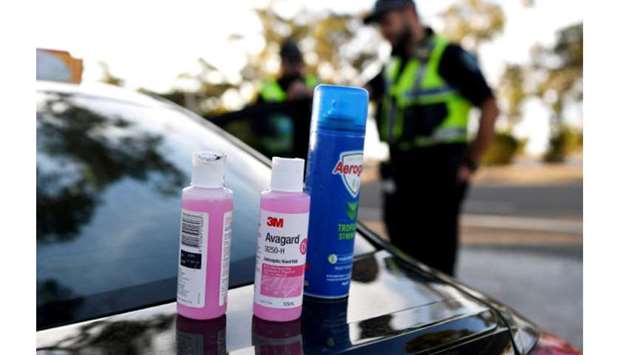Australia will close food outlets at shopping centres, place limits on weddings and funerals and ban overseas travel, the government said yesterday, after a jump in the number of coronavirus infections.
Many of the newly identified cases of Covid-19 came from a cruise ship whose passengers were allowed to disembark last week even though several showed signs of illness.
The country, where many schools remain open, has now recorded eight deaths and more than 2,000 cases, and is beginning to track others experiencing sharp increases in recorded infections.
In the latest of a series of restrictions, Prime Minister Scott Morrison said five people would be able to attend weddings — the couple, the celebrant and two witnesses — while funerals would be limited to 10 guests.
Beauty salons would also close and real estate open houses and auctions would be halted when the new rules come into force from midnight today.
“If we do all these things then we are going to be able to put greater pressure on slowing the rate of the spread of this virus,” Morrison told reporters in Canberra.
An eighth person, a woman in her 70s, died and the number of cases rose fastest in the most populous states of New South Wales and Victoria. “We are very worried about the rate of the rise,” said Brendan Murphy, Australia’s chief medical officer. Of some 400 new cases announced yesterday, around 90 were passengers who disembarked the Carnival Corp’s Ruby Princess cruise ship.
In a chain of events described by New South Wales state Police Minister David Elliott as a “monumental stuff-up”, about 2,700 passengers were allowed to leave the ship when it docked in Sydney on March 19 despite about a dozen passengers showing signs of ill health.
About 60% of the passengers were Australian, and 20% were from the United States, ship records showed.
By yesterday, around 130 of those passengers had tested positive and officials were frantically hunting down other travellers to test them and track their movements. Morrison said authorities would consider harsh new penalties for anyone who does not comply with an self-isolation order.
Australia has already ordered pubs to close and restricted restaurants and cafes to offering takeaway services in a bid to limit social gatherings.
The economic impact was becoming visible, with long queues forming outside offices of the main welfare agency across the country.
Westpac economists said the extraordinary measures to counter the spread of the disease would push the unemployment rate above 11%, which would be the highest since the country was last in recession in the early 1990s.
For many, there has been anger over mixed messages from officials in Australia’s system of federal and state governments, which are separately responsible for regulating different services.
The operation of schools has been a flashpoint, with Morrison advising they remain open, while some state leaders urged parents to keep their children home.
“It is as clear as mud and no wonder parents are confused out there,” Anthony Albanese, the leader of the federal opposition party, told ABC Radio. Morrison was due to meet with the national cabinet formed to deal with the crisis, comprising state and federal political and health officials, later yesterday to discuss the next steps.

Disinfectant products are seen on a car whilst motorists fill out paperwork for police as they cross back into South Australia from Victoria during the coronavirus disease outbreak, in Bordertown, Australia.
